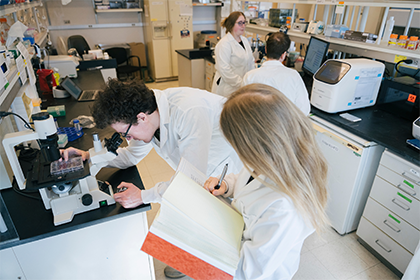October 27, 2022 by
Kate Strotmeyer and Jeff Wakefield
A national cancer research event called Convergence brought experts from around the country and the world to the University of Vermont October 24-27 to discuss interdisciplinary techniques to advance cancer treatment. The experts, along with UVM Cancer Center faculty, presented information about their cutting-edge cancer research.

As part of the conference, 100 students from five area high schools, broken into small groups, visited UVM cancer research labs, including the Chatterjee Lab, pictured above. (Photo: Bailey Beltramo)
A national cancer research event called Convergence brought experts from around the country and the world to the University of Vermont October 24-27 to discuss interdisciplinary techniques to advance cancer treatment. The experts, along with UVM Cancer Center faculty, presented information about their cutting-edge cancer research.
The conference was co-hosted by the UVM Cancer Center and the National Science Foundation-sponsored Cancer Convergence Education Network.
As part of the UVM activities, 100 students from five local high schools attended a half-day “Careers in Cancer” event on October 24. Students will receive career advice from experts and observe faculty and students working in several of the university’s cancer research labs.
The UVM event consisted of 24 lecture-discussions over four days, with participation from faculty, graduate students and postdoctoral trainees at the university.
In addition to UVM faculty, presenters included researchers from the University of Cambridge (England), Sloan Kettering, Dana Farber, Columbia University, Mass General Hospital Cancer Center, the University of Pennsylvania, Duke, Rutgers, and the National Institute of Allergy and Infectious Diseases. These speakers were experts in oncology, immunology, virology, epigenetics and genomics, epidemiology, computer sciences and artificial intelligence, physics, mathematics, and engineering.
“The Convergence conference is about the future of cancer research,” said Randall Holcombe, M.D., M.B.A., director of the UVM Cancer Center, which organized the UVM event. “Integrating interdisciplinary approaches to cancer research — the convergence of the conference’s title — is prompting new questions, setting new research directions and providing researchers with new technologies that are already leading to new cancer treatments and cures,” said Holcombe, who presented at the event.
Learning about career pathways and observing science in action
The high school student attendees enjoyed a four-hour-long immersive experience on October 24. They then broke into small groups, and interacted with world-renowned scientists to learn about career pathways in cancer research. They students also visited UVM cancer research labs to meet with a range of faculty researchers, see science in action, and view demonstrations.
The demonstrations included growing and visualizing crystals to understand protein structure, microscopy to visualize the important components of a dividing cell, and exploring the various equipment needed to successfully carry out cancer research.
“Both the Cancer Convergence Education Network (CCEN) and the UVM Cancer Center view community connection as a key component of furthering interdisciplinary cancer research,” said Arnie Levine, Ph.D., the founder of the CCEN program. “Including local high school students, who are the future of science, in the conference is an important way to further this objective and one that NSF supports”
Students from Burlington High School, South Burlington High School, Winooski High School, Essex High School, and Champlain Valley Union (CVU) High School attended the event.
About the Convergence Conference
The Convergence conference at UVM, and at other institutions, was developed by the Cancer Convergence Educational Network. The Network provides a mechanism for direct feedback from diverse members of Convergence teams to improve existing research; to foster new collaborations borne of the proximity of scientists from a range of backgrounds that may lead to new original research efforts; to offer professional connections for trainees seeking post-doctoral or professional positions, and to promote the development of a new field with new practitioners who are approaching important questions in cancer biology and developing research in physics in an unique fashion with significant impact.
The Cancer Convergence Educational Network is funded by the National Science Foundation and
Stand Up to Cancer.